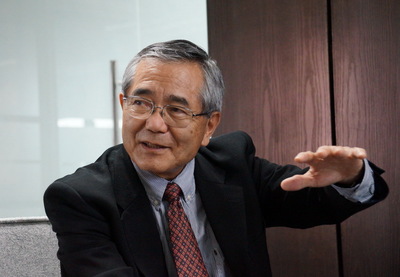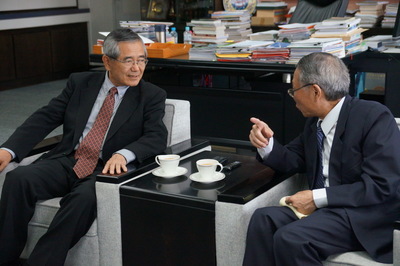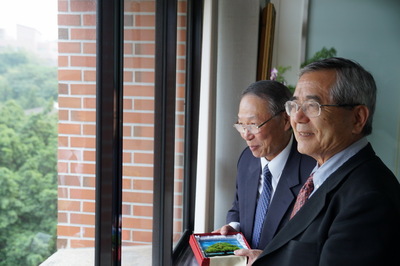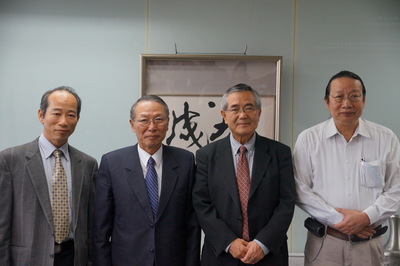Nobel laureate Ei-ichi Negishi visits NCKU




Tainan, Taiwan, Nov. 30, 2012
Nobel laureate Ei-ichi Negishi visited National Cheng Kung University (NCKU), southern Taiwan, Nov. 30. He was greeted in President’s Office by NCKU president Hwung-Hweng Hwung.
Ei-ichi Negishi, a Purdue University chemist, who visited NCKU for the first time was very impressed by the strong strength of NCKU in academic research when president Hwung told him that NCKU has respectively ranked the 14th and the 26th in its engineering and materials science fields worldwide.
When asked about what can young scientists do to win a Nobel price, Dr. Negishi responded,” the most important thing is that you like what you want to do for decades and be excellent in the field you choose.”
As one of the Herbert C. Brown Distinguished Professor of Organic Chemistry, Dr. Negishi acclaimed that the most critical period for his scientific discovery is the time he spent in the H. C. Brown Laboratory of Chemistry since 1979.”
Dr. Negishi discovered catalytic reactions using a number of transition metals that allow various organic compounds to be synthesized widely, efficiently and selectively for use in fields ranging from medicine to materials development.
He received the Nobel Prize in Chemistry in December 2010 for developing metal-based reactions called palladium-catalyzed cross-coupling, that allow for easy and efficient synthesis of complex organic compounds.
Negishi shared his opinion of winning a Nobel, “the chance of winning a Nobel was one in 10 million,” and he encouraged the young scientists to stick with what you like to do for a long period of time and go through all the steps you needed to excel academically.
Negishi said that he grew up in Japan and received a bachelor's degree in organic chemistry from the University of Tokyo in 1958. He moved to the United States in 1960 to attend graduate school at the University of Pennsylvania as a Fulbright-Smith-Mundt scholar, earning a doctorate in organic chemistry in 1963.
Negishi went to Syracuse University in 1972, where he was an assistant professor and then an associate professor before returning to Purdue in 1979 and he was appointed the H. C. Brown Distinguished Professor of Chemistry in 1999.
Negishi has authored more than 400 publications including 2 books, one of which is the Handbook of Organopalladium Chemistry for Organic Synthesis
Nobel laureate Ei-ichi Negishi visited National Cheng Kung University (NCKU), southern Taiwan, Nov. 30. He was greeted in President’s Office by NCKU president Hwung-Hweng Hwung.
Ei-ichi Negishi, a Purdue University chemist, who visited NCKU for the first time was very impressed by the strong strength of NCKU in academic research when president Hwung told him that NCKU has respectively ranked the 14th and the 26th in its engineering and materials science fields worldwide.
When asked about what can young scientists do to win a Nobel price, Dr. Negishi responded,” the most important thing is that you like what you want to do for decades and be excellent in the field you choose.”
As one of the Herbert C. Brown Distinguished Professor of Organic Chemistry, Dr. Negishi acclaimed that the most critical period for his scientific discovery is the time he spent in the H. C. Brown Laboratory of Chemistry since 1979.”
Dr. Negishi discovered catalytic reactions using a number of transition metals that allow various organic compounds to be synthesized widely, efficiently and selectively for use in fields ranging from medicine to materials development.
He received the Nobel Prize in Chemistry in December 2010 for developing metal-based reactions called palladium-catalyzed cross-coupling, that allow for easy and efficient synthesis of complex organic compounds.
Negishi shared his opinion of winning a Nobel, “the chance of winning a Nobel was one in 10 million,” and he encouraged the young scientists to stick with what you like to do for a long period of time and go through all the steps you needed to excel academically.
Negishi said that he grew up in Japan and received a bachelor's degree in organic chemistry from the University of Tokyo in 1958. He moved to the United States in 1960 to attend graduate school at the University of Pennsylvania as a Fulbright-Smith-Mundt scholar, earning a doctorate in organic chemistry in 1963.
Negishi went to Syracuse University in 1972, where he was an assistant professor and then an associate professor before returning to Purdue in 1979 and he was appointed the H. C. Brown Distinguished Professor of Chemistry in 1999.
Negishi has authored more than 400 publications including 2 books, one of which is the Handbook of Organopalladium Chemistry for Organic Synthesis
Provider:
新聞中心
Date:
101.12.03



